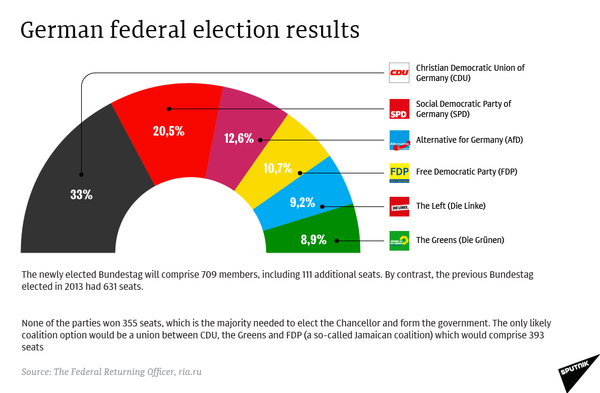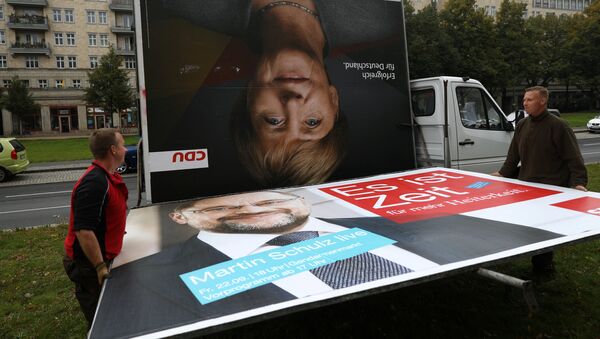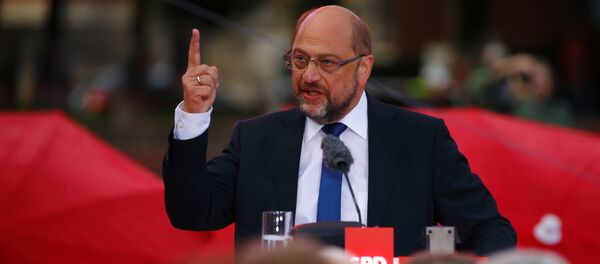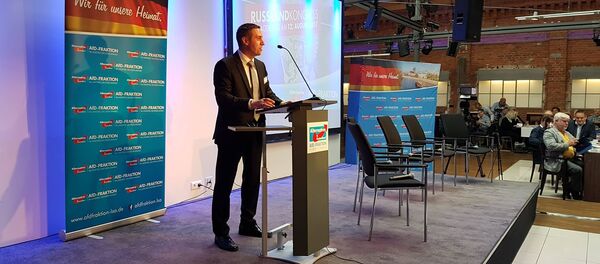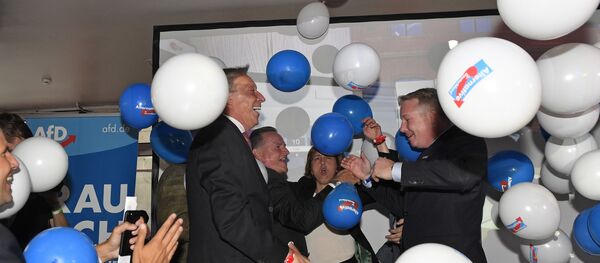MOSCOW (Sputnik) — A decline in support for Germany's two most powerful political parties, revealed in the results of Sunday’s Bundestag election, was caused by the parties’ incapability to propose new decisions, as well as by crucial mistakes made by the parties in the nation's ruling coalition, experts told Sputnik.
The German ruling coalition of 2013-2017, called the Grand Coalition, had two components: the Christian Democratic Union and its Bavarian sister party, the Christian Social Union (CDU/CSU), led by Chancellor Angela Merkel, on the one hand; and the Social Democratic Party (SPD), led by former EU Parliament President Martin Schulz on the other. In Sunday’s election, the CDU/CSU got 33 percent of the votes, while the SPD came in second with 20.5 percent. Both parties witnessed their worst election results in decades.
The former grand coalition
Ulrich Brueckner, professor of European Union studies at Stanford University in Berlin and in California, told Sputnik that Merkel was lucky to remain in the Chancellor’s seat.
"If we just look back to what Germany and Europe went through in the last years, it’s quite a success to see that [Merkel] still manages to stay in the chancellery. Because if the elections would have been in winter 2015-2016, she certainly would have lost because of the security situation, the migrants, the rising populism and the lack of support for her politics in the European Union," Brueckner said.
Martin Schulz also failed to present himself as a real leader interesting enough for the future of Germany, failing to use "one unique selling point which he has as a candidate, which is his European profile," Brueckner added.
"And he never activated European strategy, but he rather presented himself as a former mayor of a little town in Germany, and this didn’t sell. This was not what people found impressive," Brueckner explained.
"Both Merkel's party and the SPD lost badly. In absolute numbers, the CDU/CSU [lost] even worse, though some of that loss was the Free Democratic Party's gain. My guess is it is the backlash against the all-too-generous migrant policy," Norpoth said.
In September 2015, amid a Europe-wide migration crisis, Merkel announced an open-border policy, which led to over a million migrants, primarily from North Africa and the Middle East, arriving in the country.
Norpoth's point of view was supported by some other experts, for example, Alexander Rahr, a German political analyst and CIS and Russia program director at the German Council on Foreign Relations (DGAP).
"Many people believe that in the last two years, this has worsened their lives, because Merkel two years ago proclaimed an open door policy, and almost two million migrants who were culturally alien to the Germans, primarily from Arab countries, came to Germany. According to my observations, this issue has absolutely split the society, and there are people who support Ms. Merkel in this matter, but there is a critical mass that is absolutely against. And this mass taught the CDU a lesson," Rahr said, adding that "people would have chosen the CDU if Merkel had moved back to the center, in the direction of the conservative electorate."
"They were responsible, and they were held responsible as well, and the one factor that they could not get in a confrontation campaign with CDU – they were too nice, too moderate," said Schulze, adding that "solidarity and social justice are not enough" to form the basis of an election program.
According to Schulze, the SPD would have gained more voices if it raised the issues of EU and German Eastern policy, the relations with Russia and the "bloody mess" in Ukraine.
Elmar Altvater, a former Professor of Political Science at the Otto-Suhr-Institut at the Free University of Berlin, says that the main problem of the SPD is that they walked away from their roots.
"The decay of the SPD is caused by many factors: first, the disappearance of the class basis of the party, of the working class as a political factor, and second, the failure to build up a new social democratic project," Altvater said.
Nominal and real opposition
As the results of the first exit polls were revealed on Sunday, Schulz announced that he would enter the opposition and become its leader. However, experts do not believe that the SPD will be strong enough to maintain leading position.
"The only thing the SPD can do to survive and not be completely marginalized is to develop a sharp profile as an opposition party. And this is what Schulz announced," Brueckner stated.
He added that Germany was "committed to pluralism," which means having a choice.
"And if you declare things as [something] without alternative, then you give birth to an alternative, which became the ugly face of the AfD," Brueckner said.
According to Peter Schulze, it is the AfD that will be the real opposition, with the issues of internal security and the migration crisis also giving reasons for concern for the future government.
"A strong minority of German voters wished to end the reign of the Great Coalition. The CDU/CSU and the SPD lost a large number of votes. Most voters were disappointed with all the parties represented earlier in the Bundestag. Therefore, they voted for the AfD," political scientist and SPD member Nils Diederich said during the Moscow-Berlin video conference.
Diederich added that many voters also turned to the AfD from The Left (Die Linke) party.
"Especially in East Germany, voters were disappointed by the political processes in the country. They voted out of protest. For this reason, the extreme right party appeared in the Bundestag," Diederich stated.
Given that the SPD became the opposition, the most likely coalition to be created in Germany is a so-called 'Jamaica' group which would include the CDU/CSU, the FDP and the Greens. The minority parties gained 10.7 and 8.9 percent of the votes, respectively. The group got its name from the colors associated with the parties, which is similar to the black-yellow-green color scheme of the flag of Jamaica.
Traditionally, the office of the Foreign Minister in Germany is given to a member of the second biggest political force in the ruling coalition. However, there is a possibility that this time, the tradition will not be upheld, as different experts have different forecasts.
Rahr sees the head of The Green party Cem Ozdemir as the most likely candidate for the office.
"I believe that the FDP does not want to lead the Ministry of Foreign Affairs. The most likely candidate for the post of Foreign Minister is Cem Ozdemir, which is not very good for Russia, because he criticized [Russian President Vladimir] Putin," Rahr said during the video conference, adding that Merkel was "trying to find some kind of compromise" in this situation.
Schulze, on the contrary, strictly ruled out the candidacy of The Green party member to take the post.
"I don’t think that the CDU or the Liberals will give this position which also means the position of the vice-chancellor to the Greens. You can cross them out. So, it’s only speculation. Definitely not a member of The Green party as a foreign minister. Definitely," Schulze stressed, adding that FDP leader Christian Lindner could very well take the job.
The coalition talks are expected to be complicated, despite Martin Schulz expressing his certainty that Jamaica coalition "won’t fail." However, Katja Kipping, the chairperson of The Left party, said on Monday that the coalition, if formed, would not last the next four years.
